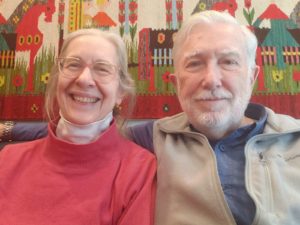 Progressive Voice is a bi-weekly opinion column. The views expressed are solely the authors’.
Progressive Voice is a bi-weekly opinion column. The views expressed are solely the authors’.
By Detta Kissel and Charles Head
A growing group of Arlingtonians are calling for the County to form a broadband authority to provide high-speed, low-cost internet.
This movement arose in response to scenes of school children accessing lessons in fast food parking lots, along with others seeking jobs, vaccines, and assistance. The pandemic has only highlighted what was there all along, excessively high-priced internet access that created a digital divide, leaving some Arlington residents without access to services essential to modern life, and everyone paying more than we should.
The pandemic also revealed that not just any internet connection will do. During this pandemic, working parents compete with their children for bandwidth, and social and civic engagement requires a reliable connection. Non-fiber connections are quickly overwhelmed, leading some providers to respond with data caps, price-hikes, and throttling. Only optical fiber provides reliable, high speed internet connectivity that can handle the demands of any household, now and in the future.
To eliminate the digital divide and protect all residents from higher rates, slower speeds, and reduced services, Arlington should join other jurisdictions in Virginia and around the country that treat the internet as a utility, with optical fiber infrastructure owned by the locality.
Virginia law allows localities to establish broadband networks by creating a broadband authority, an entity similar to a utility commission. A broadband authority is a flexible tool that can build and own infrastructure, and provide internet service directly, or license network access to multiple internet service providers who compete for customers. While customers would not be required to switch to service provided through the broadband authority, experience shows that broadband authorities provide higher quality internet service at lower rates, due to the increased competition. What’s more, Arlington need not go it alone; we could partner with adjacent jurisdictions to create a regional network with greater economies of scale and cost sharing.
Does this sound expensive? There are three things to remember. The first is that Arlington already built the backbone of this network. Nearly 10 years ago, the county government made a strategic investment that has more than paid for itself — it chose to build a fiber network to provide its own internet services rather than remain dependent upon a large telecom. While building its network for government needs, the County included fiber sufficient to provide service to every home and business in Arlington. The task that remains is to extend the County’s network by running fiber to homes and businesses in Arlington.
This task won’t be cheap, but the second thing to remember is that, under Virginia law, a broadband authority can secure funding in a manner that does not affect the credit rating of the county. A broadband authority has access to state and federal funding sources and can borrow funds to be paid back with income from internet customers. Experience demonstrates that even when customers pay the cost of running fiber to their homes in monthly increments, their monthly bills are still substantially lower than the cost of their current internet connection, while also providing much higher speeds and better service. For an example of this approach, see Ammon, Idaho, a small city with one of the best networks in the US — and among the lowest costs of internet access in the world.
During this pandemic, Arlington County is moving forward on several initiatives to help provide wireless internet service to under-served segments of our community. These worthy projects will do much to help, but they are like band-aids on a serious wound. We need to start now to recognize the internet as a utility worthy of public investment in the most future-proof technology, and create the vehicle to do it — a broadband authority.
The county solved its own internet problem several years ago. Now that we find Arlington residents dependent on large telecoms to provide essential services, will Arlington do for its residents what it chose to do for itself? Please join us in calling on the County Board to form an Arlington Broadband Authority to start providing affordable, essential internet service to our residents.
For more information, see ArlFiber.org.
Detta Kissel is a retired federal attorney, volunteering with the Arlington Democrats and the NAACP. Charles Head retired from two jobs: as a nuclear engineer with the Department of Energy and as a computer system administrator with the State Department. He is an Arlington election official and did volunteer work on redistricting reform. Detta and Charles have lived in Arlington for 40+ years and both are excited to work with ArlFiber to advocate for an Arlington Broadband Authority.

